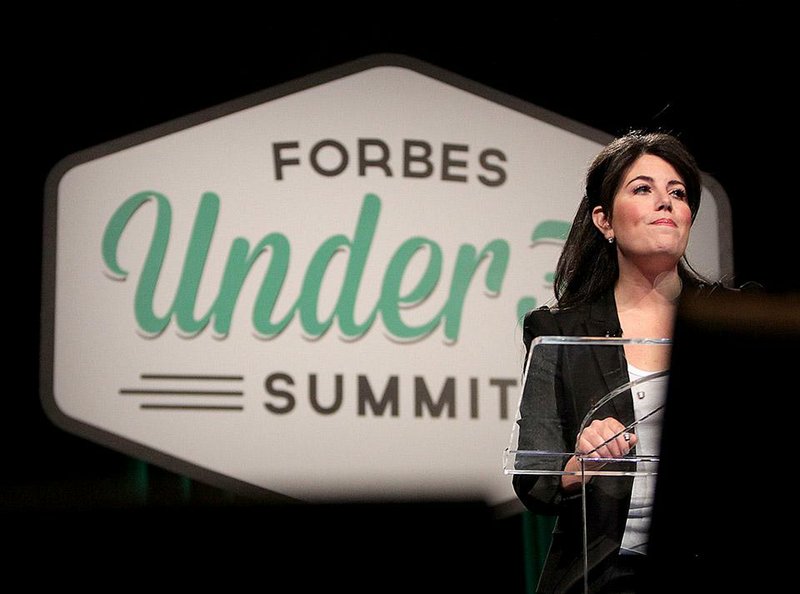WASHINGTON -- When onetime White House intern Monica Lewinsky broke her silence with a speech this week, one subject took her nearly to tears.
Lewinsky's voice cracked as she recalled the moment in January 1998 when she was first confronted by FBI agents and lawyers working for Kenneth Starr's office of independent counsel, who threatened her and her mother with criminal prosecution if she did not agree to wear a wire against President Bill Clinton.
Lewinsky, now 41, has long felt that she was mistreated by authorities in the 12-hour marathon session, which began as an ambush in the food court at the mall at Pentagon City in Virginia and then moved to a hotel room at the mall's adjoining Ritz-Carlton hotel.
As it turns out, so did government lawyers who conducted a comprehensive review of the incident in 2000, two years after the encounter. Their findings are contained in a report -- recently obtained by The Washington Post -- that key players had long believed was under court-ordered seal.
According to the report, a prosecutor who confronted Lewinsky "exercised poor judgment and made mistakes in his analysis, planning and execution of the approach." The report, written by two lawyers appointed to investigate the matter by Robert Ray, Starr's successor as independent counsel, concluded that the "matter could have been handled better."
The existence of the report, as well as its general conclusions, were first revealed in the 2010 book The Death of American Virtue: Clinton vs. Starr, a study of the Lewinsky investigation by Ken Gormley, dean of Duquesne University's law school.
However, the report has not before been in wide circulation. Gormley quoted Ray and the report's chief author, Jo Ann Harris, who had served as assistant attorney general, as indicating that the report was sealed from public view by a three-judge panel that oversaw Ray's work.
The Washington Post obtained a copy of the report by filing a request under the Freedom of Information Act to the National Archives.
Lewinsky declined to comment for this article.
More than 100 pages long, the report provides a detailed account of Lewinsky's first encounter with Starr's lawyers, based on documents and interviews with those involved.
When first approached at the food court and told she that was the subject of a criminal investigation, Lewinsky immediately told an FBI agent to "go f*** yourself" and then told him to speak to her attorney, according to the report.
She agreed to go with the agents to a room at the adjoining Ritz-Carlton only after she was told she would learn more about the situation without a lawyer present.
For hours, according to the report, Lewinsky tried "in various ways" to consult with, speak to or visit Frank Carter, a lawyer she had hired to assist her when she was deposed in the Paula Jones sexual harassment case against Clinton.
The report says Lewinsky spent those hours "crying, sobbing, regaining her composure, screaming." One prosecutor told investigators that Lewinsky's demeanor had an "unsettling effect on his own state of mind."
Lewinsky was repeatedly told that she could speak with whomever she wished but was then warned that her cooperation would become less valuable if she consulted with anyone, including Carter, before agreeing to assist prosecutors, the report says.
In exchange for her cooperation against Clinton, prosecutors offered her immunity from charges that she had lied in a sworn affidavit in the Jones lawsuit by falsely claiming she had not had an affair with Clinton.
The confrontation began when Lewinsky showed up for what she thought was a lunch date with Linda Tripp -- the colleague who had been secretly recording conversations with the young intern -- and it did not end until 12:45 a.m., after Lewinsky's father hired a new lawyer for her to deal with the matter.
Department of Justice guidelines generally prohibit prosecutors from having direct contact with people under investigation who have hired lawyers, particularly while negotiating their cooperation in a criminal matter.
The report takes up the issue of whether office of independent counsel lawyers and FBI agents erred in confronting Lewinsky without Carter present.
The report finds that the ethics of the situation were murky: The guidelines required that contact with Lewinsky be limited only if prosecutors knew she had hired a lawyer to deal with the same subject matter as their investigation. They argued that she had hired Carter to help her deal with the Jones civil suit, not a criminal investigation into Clinton's actions.
Although the two cases became intertwined, the report concludes that nothing in the Justice Department's guidelines provided a "clear and unambiguous" answer to whether the matters were so similar as to make it unethical for the prosecutors to approach Lewinsky without Carter present.
Nevertheless, the report says the office of independent counsel lawyers, notably Michael Emmick, the lead prosecutor on the scene, "failed to appreciate the closeness of the call as to whether Lewinsky was represented."
"We find that OIC conduct was influenced, and indeed largely driven, by the poor judgment Emmick exhibited in his formulation and execution of the approach to achieve Lewinsky's cooperation," the report concludes. "The Department requires far greater respect for an individual's choice of attorney, for attorney-client relationships, and for the role of defense attorneys in the process than that exemplified in this case."
Emmick, who served for 25 years as an assistant U.S. attorney in Los Angeles and is now a criminal-defense lawyer, declined to comment, as did Starr. Ray did not respond to a request for comment.
Information for this article was contributed by Alice Crites of The Washington Post.
A Section on 10/24/2014

